Notes from the Editors
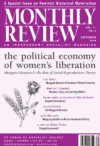
This special issue of Monthly Review honors the fiftieth anniversary this month of Margaret Benston’s landmark “The Political Economy of Women’s Liberation.” The essay sparked a revolution in Marxian thought, the full implications of which are only now being perceived in contemporary social reproduction theory. We have reprinted Benson’s pieces together with contributions by Silvia Federici, Martha E. Gimenez, Selma James (interviewed by Ron Augustin), Leith Mullings, Marge Piercy, and Lise Vogel, all of whom have played leading roles since the 1970s in the development of feminist historical materialism. | more…
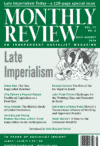
This special issue of Monthly Review is meant both to celebrate the fiftieth anniversary of Harry Magdoff’s The Age of Imperialism: The Economics of U.S. Foreign Policy, which was devoted to the analysis of imperialism at the height of U.S. hegemony, and to carry this analysis forward to address the present era of late imperialism in the twenty-first century. In bringing together work on the political economy of imperialism in the current era of globalized production, we seek to transcend the now fashionable view within the Western academic left that the concept of imperialism is obsolete. The imperialist world system stands not only for capitalism at its most concrete historical level, but also for the entire dynamic structure of power constituting accumulation on a world scale, which can only be understood in terms of a developing global rift between center and periphery, global North and global South. Failure to attend to this fissure would be fatal for humanity. | more…
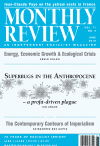
The situation in Venezuela has become extremely dire due to Washington’s heightened economic warfare, its continuing attempts to engineer a political coup, and its growing threats of massive military intervention—all aimed at bringing down the Bolivarian Republic. The recent seizure of Venezuelan oil assets in the United States and its gold reserves in British banks, as well as the sanctioning of Venezuelan oil sales, have come on top of a long series of economic sanctions—beginning with the Obama administration and now intensified under Trump’s—that constitute nothing less than a modern form of siege warfare, extended to food supplies and medicine. But the Venezuelan Revolution has managed to resist in the face of the economic and political warfare of the most powerful imperialist nation in the world, and the reasons why are to be found in the nature of the Bolivarian Revolution and the Venezuelan people themselves. | more…
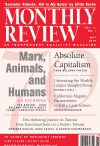
Monthly Review is now seventy years old, with its first issue appearing in May 1949. In this month’s issue, the editors reflect on the legacy of MR, the people who built it, and the ones who keep it going today. | more…
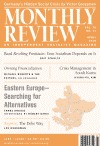
In the midst of the U.S.-directed coup attempt against the Bolivarian Republic of Venezuela in January–February, Donald Trump delivered a number of verbal attacks on socialism in Venezuela, Cuba, and Nicaragua. The immediate object was to justify U.S. attempts to overthrow the Bolivarian Republic. The less immediate, but hardly less important, goal was to tarnish the growing social democratic (self-styled democratic socialist) movement in the United States, associated with figures like Bernie Sanders and Alexandria Ocasio-Cortez. In order to safeguard their ambitious social-reform program, the new coterie of Democratic Party socialists have thus sought to separate themselves from Venezuela and other Latin American socialist states, presumably abandoning these countries to their fates at the hands of U.S. imperialism. This raises the historic question of social imperialism—a policy of social reform at home and imperial hegemony abroad. | more…
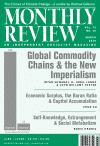
The present ongoing coup attempt organized in Washington is simply the latest in a series of such attempts by the U.S. government to overthrow the Bolivarian Republic of Venezuela over the last two decades. It can be seen as having three interrelated motives: (1) the destruction of Venezuelan socialism, (2) regaining control of Venezuela’s oil (the largest petroleum reserves in the world), and (3) reasserting U.S. hegemony over Latin America. | more…
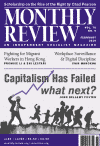
Climatologist James Hansen’s 2018 “Climate Change in a Nutshell: The Gathering Storm,” known as the Nutshell document, is the single most important analysis currently available for general readers seeking to stay abreast of the science and politics of global warming. Nevertheless, denial of the extent of the conflict between capitalism and the climate remains pervasive. Such views were subjected to a strong refutation by Enno Schröder and Servaas Storm in a November 2018 paper entitled “Economic Growth and Carbon Emissions: The Road to ‘Hothouse Earth’ Is Paved With Good Intentions.” | more…
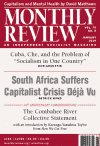
In this issue we commemorate the fortieth anniversary of the publishing of the definitive version of The Combahee River Collective Statement in Zillah Eisenstein, ed., Capitalist Patriarchy and the Case for Socialist Feminism. We are also extremely pleased to announce Monthly Review Press author Kohei Saito has won the prestigious Deutscher prize for 2018 for his Karl Marx’s Ecosocialism: Capital, Nature, and the Unfinished Critique of Political Economy. There is no doubt that this book constitutes one of the great works of Marxian theory in our time. | more…
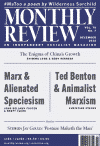
With the dramatic rise of eco-Marxism in recent years, a corresponding revolution has been taking place in studies of the human-nonhuman animal relationship. Previous critical analyses with respect to the position of animals in human society have been largely dictated by animal-rights discourse, more recently represented by figures such as Peter Singer. Many of these analyses contend that Karl Marx, Marxism, and historical materialism understand the human-nonhuman animal relationship through a dualist, “speciesist,” or human-centric, framework—a critique most famously championed by pioneering ecosocialist Ted Benton. This issue is dedicated to analyzing the theoretical propositions underlying Marx’s analysis and to demonstrate the antispeciesist and antidualist aspects of his evolutionary-materialist understanding. | more…
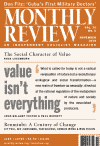
The twenty-first century has resulted in a vast upsurge of ecological Marxism and ecosocialism more generally, building on the environmental critique of capitalism embedded in classical historical materialism. At the same time, it has also engendered opposing tendencies and approaches concerning how we understand relentless ecological destruction under capitalism. This issue is dedicated to exploring the theoretical advances, schools of thought, and debates on the left in regard to our world’s ecological crisis, which threatens the survival of humanity and is inescapable within the present capitalist system of production. | more…
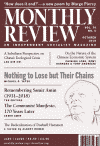
This issue is dedicated to remembering the life and work of Samir Amin (1931–2018), the greatest single theorist of imperialism of the late twentieth and early twenty-first century, and one of the leading world activists and organizers in today’s anti-imperialist struggle. | more…
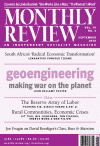
Founded in the late 1960s and recently revived, the radical organization Science for the People did—and does—far more than just publish a magazine. Chapters are forming around the country, including physicists, engineers, and biologists, as well as representatives of other scientific groupings and social movements. We at MR welcome the return of this great publication and movement of the U.S. left. | more…
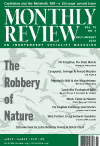
This special issue is dedicated to developing the ecological critique embodied in Marx’s theory of “metabolic rift.” Each article uses the metabolic rift perspective to uncover core contradictions of capitalism, as well as possible paths toward a new system—one that will meet human needs while protecting the earth and future generations. | more…












